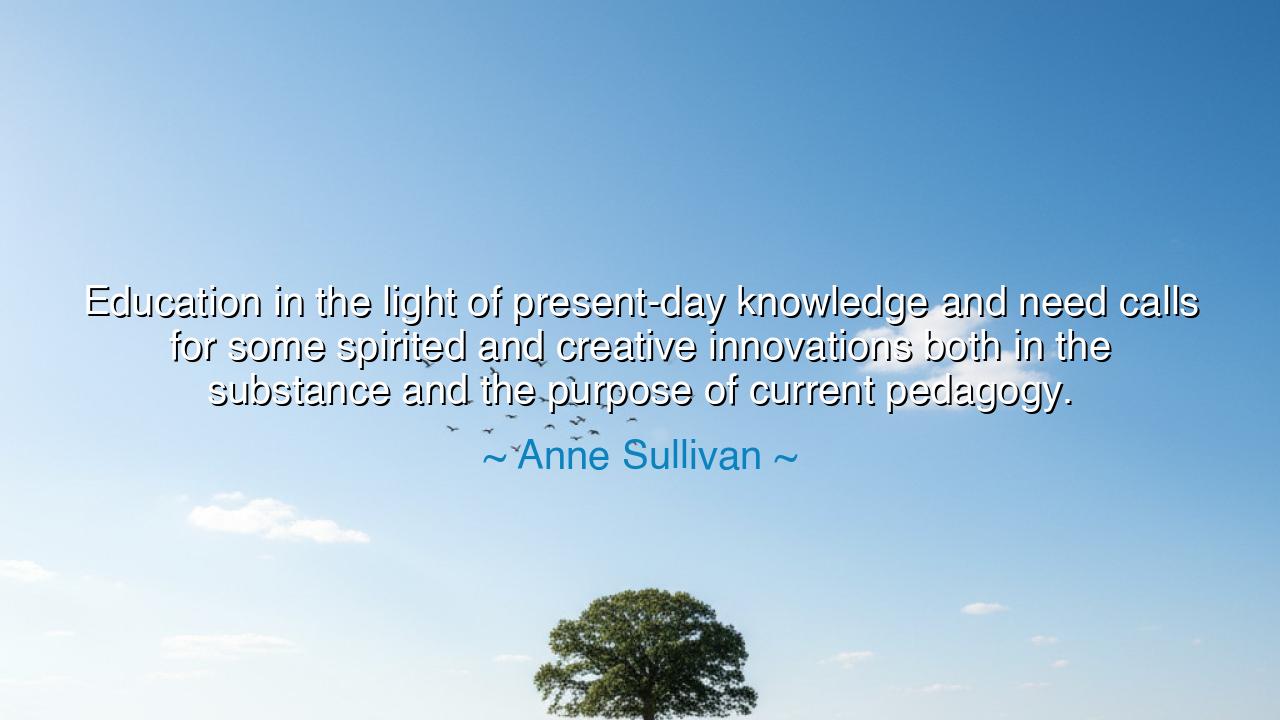
Education in the light of present-day knowledge and need calls
Education in the light of present-day knowledge and need calls for some spirited and creative innovations both in the substance and the purpose of current pedagogy.






Anne Sullivan, the devoted teacher of Helen Keller, once declared with vision and courage: “Education in the light of present-day knowledge and need calls for some spirited and creative innovations both in the substance and the purpose of current pedagogy.” These words, though spoken long ago, remain a torch for every generation. They remind us that education must never be static, chained to the past, but must evolve with the growth of human knowledge and the urgent needs of the present. Sullivan knew, through her own battles against darkness and limitation, that teaching was not mere repetition of old lessons, but the living art of awakening souls.
The origin of this truth lies in Sullivan’s life. She was herself half-blind, raised in poverty, shaped by hardship. Yet she did not allow her condition to silence her spirit. She brought her strength and creativity to Helen Keller, a child locked in silence and blindness. Traditional methods could not reach Helen; only spirited and creative innovations—Sullivan’s daring to spell words into her hand, her persistence in breaking through isolation—opened the gates of language and light. This personal triumph gave her authority to declare that teaching must be renewed constantly, shaped by both knowledge and compassion.
Consider the broader history of education. The ancients taught through rote memory, drilling facts without context. Yet when Socrates arose, he brought a new spirit—teaching by questioning, by dialogue, by awakening reason itself. His method was not about stuffing knowledge into passive minds, but about igniting curiosity, making each student a seeker of truth. This was one of the first creative innovations in pedagogy, and it transformed philosophy forever. Sullivan’s words echo the same demand: that education must serve both knowledge and the living needs of the learner.
Look also to the story of Maria Montessori, who in the early twentieth century rejected rigid discipline and lifeless instruction. She saw that children learned best through freedom, exploration, and hands-on discovery. Her methods, born of observation and courage, gave the world a new vision of classrooms filled with life and self-directed growth. Like Sullivan, she recognized that the purpose of pedagogy is not conformity, but liberation—the unlocking of potential through creativity and adaptation to the present need.
The meaning of Sullivan’s words is therefore heroic: education must be alive. It cannot rest on the laurels of the past, for knowledge expands, and the needs of society shift. To cling stubbornly to old ways is to betray the children of tomorrow. Teachers must be innovators, pioneers, builders of bridges between truth and need. The spirit of Sullivan’s teaching is that education is not preservation but transformation, not the guarding of tradition alone, but the constant rebirth of wisdom in new forms.
The lesson for us is urgent. If you are a teacher, do not be content to repeat the methods of yesterday. Ask: what do students need today? How can knowledge be made alive, relevant, empowering? If you are a learner, do not be passive, but seek teachers who challenge you, who awaken not only your memory but your imagination. And if you are a leader, invest in schools that experiment, adapt, and evolve—lest education become a dead ritual instead of a living force.
Practical actions are clear: embrace new technologies not as threats, but as tools for deeper learning. Encourage creativity alongside discipline, curiosity alongside knowledge. Let students wrestle with real-world problems, not only abstract exercises. Teach them not merely to recite facts, but to think, to question, to create. This is the essence of Sullivan’s call: education must innovate in both substance and purpose, lest it fail to meet the needs of its age.
So let Anne Sullivan’s words resound like a clarion call: “Education calls for spirited and creative innovations.” Let us not fear change in teaching, but welcome it as the breath of life. For only by renewing our ways can we honor the eternal mission of education: to awaken the human spirit, to prepare each generation not for yesterday, but for today and for tomorrow.






AAdministratorAdministrator
Welcome, honored guests. Please leave a comment, we will respond soon